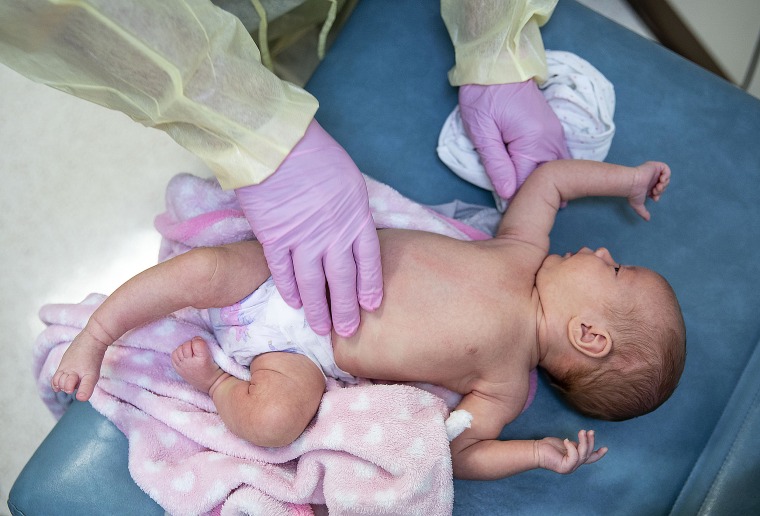All babies under 8 months old and some older infants should get an injectable RSV drug starting this fall, according to the Centers for Disease Control and Prevention.
An advisory committee to the CDC voted unanimously on Thursday afternoon to recommend the injection, then CDC Director Mandy Cohen formally endorsed that recommendation, thereby allowing the drug to be distributed to the public.
The shot is intended for two groups: The first is babies up to 8 months old who are born during or entering their first respiratory syncytial virus season, which typically starts around October. The second is infants between 8 and 19 months who are at increased risk of severe RSV disease and entering their second RSV season.
Newborns born shortly before or during RSV season should get the shot in their first week of life, the committee said.
The injection, sold under the name Beyfortus, acts similarly to a vaccine, but instead of prompting the immune system to develop antibodies to the virus — what’s known as “active immunization” — it delivers the antibodies directly to the bloodstream via so-called passive immunization.
“Expectant parents and parents of infants under the age of 8 months, as well as those with older babies, should talk with their healthcare providers and request this added layer of protection against RSV this season,” the CDC said in a statement.
Until now, no RSV-specific drugs or vaccines had been approved for use among all infants in the U.S. The only available option was an injection that protects high-risk infants.
Yet RSV can be severe among children: It leads to up to 80,000 hospitalizations and up to 300 deaths a year among those under age 5 in the U.S. Last year’s season started early and led to a dramatic spike in severe illness that overwhelmed children’s hospitals.
“Parents should be very, very much relieved that they won’t have to be concerned about the likelihood that their child could be hospitalized with RSV disease, so we do believe that this is a breakthrough," Dr. Sarah Long, a member of the CDC's advisory committee and pediatrics professor at Drexel University College of Medicine, said Thursday.
The Food and Drug Administration approved Beyfortus last month, and the injection is already approved in Europe, Canada and the United Kingdom.
The shot is made by AstraZeneca and marketed by Sanofi, which said Beyfortus is expected to be available in the U.S. ahead of the 2023-2024 RSV season.
In a study of nearly 1,500 infants, Beyfortus lowered the risk of developing a respiratory illness from RSV that required a doctor’s visit by nearly 75% for at least five months. The percentage was slightly lower in a study of babies born prematurely, which raises the risk of a severe RSV infection.
The most common side effects in the trials were rashes and reactions around the injection site.
The FDA said last month that Beyfortus will come with a warning about extreme immune responses such as anaphylaxis (a severe allergic reaction), which have been observed with other monoclonal antibodies.
The drug should also “be given with caution to infants and children with clinically significant bleeding disorders,” the FDA said.
Children who have received Beyfortus should not get the other existing RSV drug, Synagis, for the same RSV season, the CDC committee said Thursday.
Beyfortus is expected to be listed at a price of $495, though the cost to individual consumers will depend on their insurance plans.
Long said she was “extraordinarily disappointed” with that price. However, the shot will be covered under the CDC’s Vaccines for Children Program, which makes some vaccines and immunizations free to children who are uninsured, underinsured, Medicare-eligible, or American Indian or Alaska Natives.
Most children have been infected with RSV by age 2. The virus causes a lower respiratory illness that is generally mild, but in serious cases can lead to pneumonia or bronchiolitis, which inflames airways and clogs them with mucus.
Older adults and babies under 6 months old are particularly susceptible to severe outcomes.
The FDA recently approved two RSV vaccines for older adults, one from Pfizer and another from GSK.
An advisory committee to the FDA also recommended in May that the agency approve Pfizer’s maternal RSV vaccine, which is administered to pregnant mothers in order to protect their babies. The FDA is expected to decide next month whether to approve that shot.

